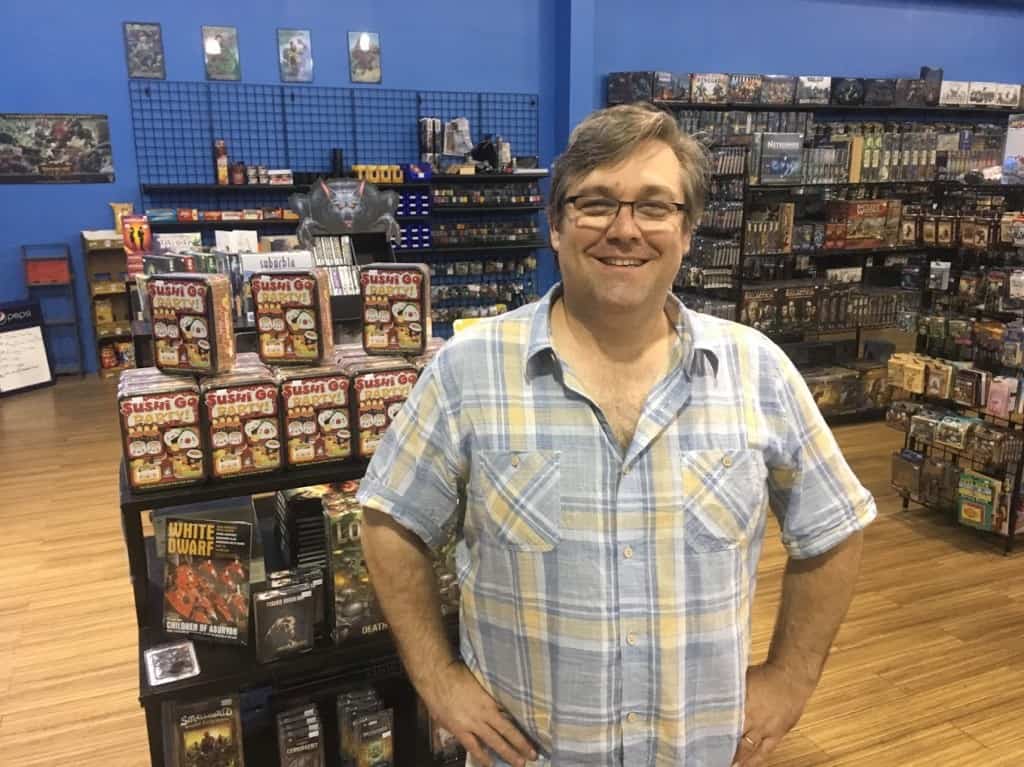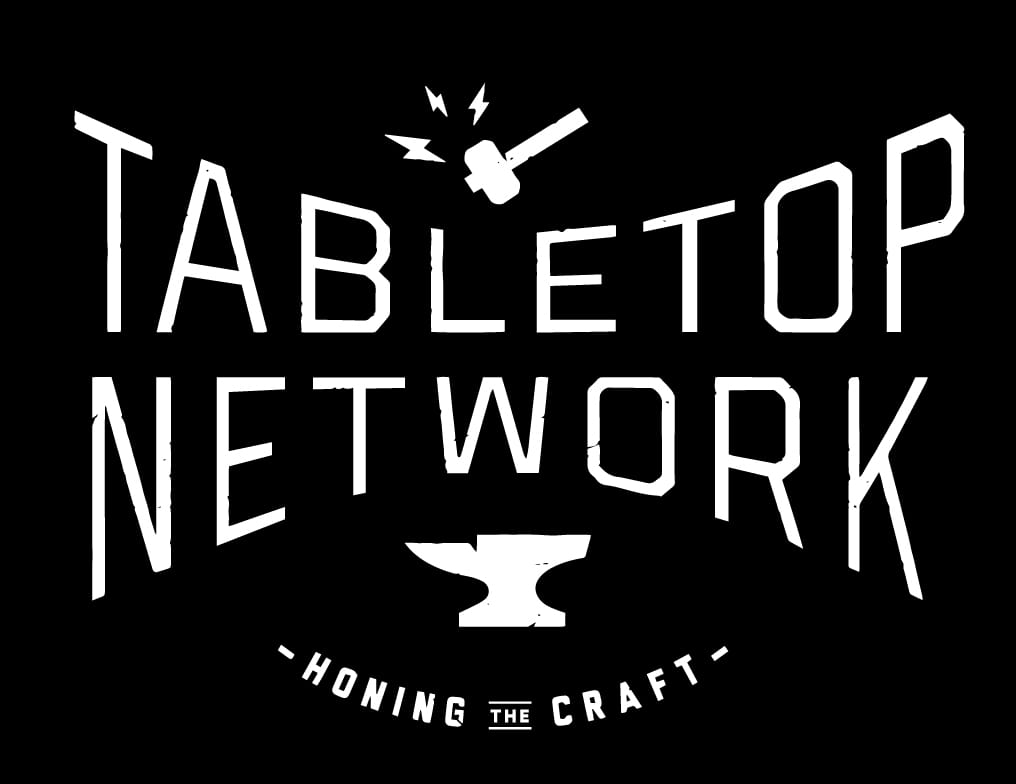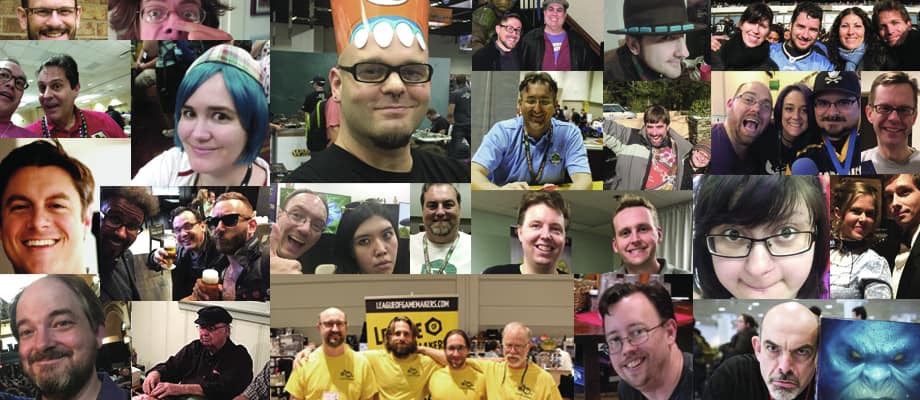
Doug Garrett, podcaster of Garrett’s Games and Geekiness, has been sitting down to discuss games with his wife, Shelley, since January 2006 for a staggering 522 episodes. His podcast was nominated for a Golden Geek in 2015 for Best Podcast. Doug’s show typically reviews 2 games per week which means he and his wife have reviewed over 1000 games, many of them Eurogames, giving Doug a deep perspective on the hobby. His podcast has over 1000 subscribers per week from all over the world, including Sweden where once he and his wife were invited to spend the night at a listener’s house. His listenership can spike depending on whether he is interviewing a special guest such as BoardGameGeek founder, Scott Alden, or UK game designer, Tony Boydell. True to form, I interviewed Doug at Game Kastle Mountain View while he was playing a board game.

Why did you start your podcast?
I had heard Mark Johnson’s podcast, Board Games to Go, and I had heard [BoardGameGeek.com founders] Derk and Aldie doing Geek Speak. I wanted to learn the technology and play around with it and ultimately, sit down with my wife and talk about games.
What is the secret to your longevity?
I like playing new games. I like talking to my wife every week. Even if we have had a busy week, we set aside some time to play a game and talk about it.
How do you decide which games to review?
Occasionally, we get review copies. I’m looking for games that appeal to me and my listeners and Shelley.
Any advice to publishers/designers looking to get their game reviewed?
IN OUR HOBBY, ADVERTISING CAN BE GOOD, BUT EVEN MORE POWERFUL IS REALLY GOOD WORD OF MOUTH BY A CREDIBLE REVIEWER.
I am always on the lookout for interesting new games. For a company to refuse to get their game reviewed is troublesome. I don’t understand why they won’t give a review copy. I will talk to a designer or publisher and let them know if I plan to review a game negatively if they gave me a copy, but if I buy the game myself, I will review it positive or negative without consulting the publisher or designer. Unsolicited games can be worth sending out, but talk to the podcaster and ask them if they would want it. Know the reviewer and understand his likes/dislikes and what his tendencies are.
What was the state of board game media when you first started recording?
We were one of the fourth and fifth podcasts in the board game genre. Podcasting was just starting out. The media was shifting from magazines such as Spielbox and Counter, which were on paper; Counter is just ePublished. BGG [BoardGameGeek.com] had been around for 5 years. There were very few video reviews, if any. Audio was the thing to do. It didn’t take up much bandwidth.
How would you assess the state of board game media now?
Very diverse, but mostly focused online. Video has become a huge part of reviews. Video editing takes so much more time than audio. I’m interested in video, but it’s hard to find the time to do it with a full time job and a limited life bandwidth.
Everything finds its way to BGG. That is the central hub for learning about games, for posting reviews. It’s nice to have sites like Opinionated Gamers with which I am affiliated. I have my podcast connected to BGG. It’s nice that there is a place where people can find you.
Which board game media do you admire the most?
What Scott Alden has done with BGG is amazing. He has created a central hub and I go there daily to get my news.
What do you think is missing or underrepresented in board game media now?
Scott is working on changing the layout to make BGG more user friendly. I understand how it’s difficult to find your way into the labyrinth if you don’t know it. Mainstream media sites, outside of Germany, cover board gaming on a lark or only at Christmas time. I wish more mainstream media like Entertainment Weekly picked up on it a bit more.
What needs to happen for board games to be covered in newspapers and mainstream magazines? Do you think that will happen?
The Entertainment community has started to pick up on board gaming. You had some football team that was totally into Catan. You are having people who are associated with mainstream media talking about games and hopefully, that wave will continue and get larger.
As a whole, how do you think board game reviewers handle the perception of bias, i.e. reviewing their friends’ games, reviewing games for hire?
Reviewers could do a better job in letting their listeners know if they received a review copy. At least for me, I have biases for designers I like and mechanisms I like. But biases in terms of not being truthful or honest, the reviewers have to be honest and the listener has to know us. Some people might think we are biased toward Ted Alspach’s games (our sponsor, Bezier Games), but we aren’t. We talk about some of [his games], but not all of them.
You had a famous debate with Dice Tower Founder, Tom Vasel, about the importance of Essen vs. GenCon. Do you think the GenCon vs. Essen is still an important debate? If so, why?
It’s less an important debate because GenCon has has grown in importance.
HOWEVER, MORE GAMES ARE RELEASED AT ESSEN AND HAVE A MORE PROFOUND EFFECT ON THE HOBBY THAN ARE RELEASED AT GENCON.
You can look at the GenCon Preview [from BGG News] and you can see at least for the last few years, a number of the games are just previews of games being released at Essen. The general public will have more access to more games at Essen than GenCon. Tom is correct that GenCon has become more important. I haven’t been to GenCon to make the comparison due to the timing with the school year. I can’t take a week off in August.
In the past, you have talked about how Kickstarter games as being lower quality than games from traditional publishers. Do you think the quality of Kickstarter games is improving?
We are no longer getting the completely undeveloped dreck from when Kickstarter first started. The term quality applies to two things: the quality of components which have increased dramatically, and the actual game design. There is still such a big variance in quality [of game design] in not ready for prime time games.
What things turn you off most from a Kickstarter game?
First off, I am not a fan of dungeon crawls. I am not a fan of minis for minis sake. Shelley is not partial to them. I am sick of co-op dungeon crawls. I am always on the lookout for card games with interesting mechanisms. But the more chrome a game has, the less likely I am to purchase it.
Can you point to any Kickstarter success stories: games you really enjoyed?
Sushi Go was a Kickstarter and has done phenomenally well. King’s Forge. Viticulture. Stonemaier [Games] has done a really good job making good games with excellent bits.
Why do you play/review Eurogames?
EUROGAMES BY DEFINITION ALLOW ALL OF THE PLAYERS TO STAY INVOLVED IN THE ACTIVITY THROUGH TO THE END OF THE GAME, UNLIKE AMERICAN-ESQUE GAMES WHERE THERE IS A LOT OF PLAYER ELIMINATION.
Even though there may be attacking [in Eurogames], you feel like you are involved the whole time.
Do you like the term Eurogame?
It’s useful in the hobby. We have defined what it is. It’s not useful for the general public. You have to define it for them to move forward. It’s better for me to ask people about games of which they might have heard. Ticket to Ride and Catan are great touchstones for letting people know the kind of games I really like.
Has that definition of Eurogame changed over time?
I think it has expanded to include designs from Japan; it has expanded geographically. As more mechanisms have been explored and add to it, that has changed the term as well.
How would you defend Eurogames against detractors who call them soulless cube pushers or boring?
It’s true that theme may be secondary. But often times, the theme at the very least helps with the learning of the rules and the interconnectivity of the mechanisms.
If you had to choose a short list of definitive Eurogames, which games would be in your list?
Catan. Ticket to Ride. Web of Power. El Grande. Agricola. Pandemic. Castles of Burgundy.
What do you think are the best Eurogames released in the past year?
Codenames is a great word game. Bretagne (a lighthouse game). Animals on Board was a really good release. Should have been up for the Spiel de Jahres [German Game of the Year]. Lanterns: Harvest the Festival. Dadaocheng. Diluvia Project. Between Two Cities. Steam Time. Mombasa.
Which designers are designing the best Eurogames today? Any designers to watch out for?
We are still getting a lot of interesting games from Japanese publishers and designers. I am always on the lookout for games from Vlaada Chvátil from Czech Games Edition. Matt Leacock and Ted Alspach are local [to me] and are designing interesting games. I am happy to see Tony Boydell has been successful.
Which publishers are publishing the best Eurogames today? Any publishers to watch out for?
WHAT’S GREAT ABOUT PUBLISHING [RIGHT NOW] IS THAT IT’S NOT LIKE HOW IT USED TO BE WHEN IT WAS LIKE: WHAT IS THE LATEST GAME FROM KOSMOS, MAYFAIR, OR RIO GRANDE? NOW IT’S LIKE: WHAT IS THAT GAME FROM THE LONE GUY IN A BOOTH [AT ESSEN] THAT MAY BECOME THE NEW BOARD GAME SENSATION?
As a style of game, do you see Eurogames as still rising, having hit a plateau, or starting to decline?
Given that more articles [about board games] are still coming out in mainstream media, I think board gaming and Eurogames are still on the rise.
Do you see the American public embracing Eurogames more?
Yes. Definitely, because they are becoming more aware of them, how Eurogames are different than the kid-focused games they are used to seeing.
Catan is the perhaps the biggest gateway Euro game. How do you feel about Catan today? Is it a game you play or would want to play?
Not really. It was the game that got us into the hobby. It’s slow. It can get bogged down with the trading. It takes too long for what it is. Because we are at the cutting edge of what’s brand new, we have moved on from it.
So, what is the lasting appeal of Catan?
It has been out longer. More people are exposed to it as their first game and it is so different than what they are used too, like Sorry or MONOPOLY, so it has Wow factor.
Do you see different styles of Eurogames depending on the country they are from? Such as from Germany or France or Japan? What are the differences in style?
When we first got into Eurogames, there was some differentiation. Because of the Internet and the worldwide reach of games, there has been a homogenization of design. There has been a sharing of mechanisms across cultures. [In the past] French games had much more luck factor in them. German games were dryer and mechanistic. All of that has shifted and changed as we have shared ideas through the Internet.
What are the new trends in Eurogames that excite you?
I can’t answer that question, because the next big mechanism like card drafting or the co-op craze that has been happening haven’t necessarily played themselves out. The biggest trend is games with an ending like Pandemic Legacy and Time Stories, which were both nominated for the Kennerspiel de Jahres [German Game of the Year for Gamers]. This is where people are seeing interesting innovations.
People will see more games like that. [These types of games] make sense in the retail arena.
Any plans in the future for your podcast?
After 10 years, [Shelley and I] have a back and forth that works really well that listeners want to tune into. I just like sitting down and talking with my wife every week.









